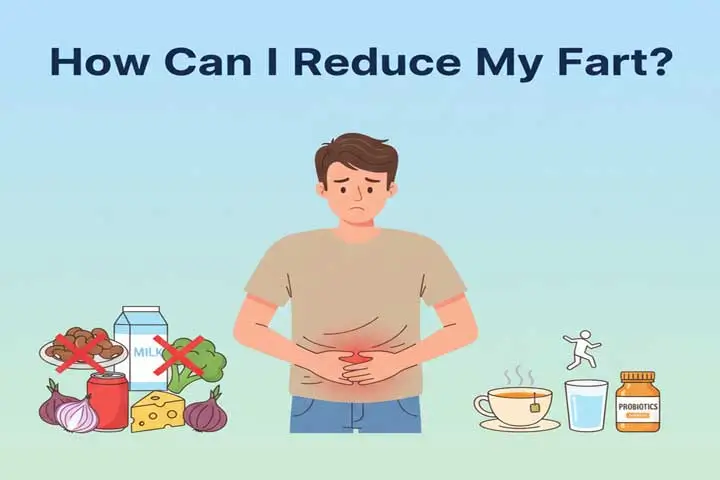Let’s be honest—everyone farts. It’s a completely natural part of life. But when it becomes frequent, loud, or smelly, it can feel embarrassing and uncomfortable. If you’ve ever asked yourself, “How can I reduce my fart?” you’re not alone.
The good news is that excessive gas usually has simple causes, and there are plenty of ways to reduce it through diet, lifestyle adjustments, and natural remedies. In this guide, we’ll explore why farting happens, what triggers excessive flatulence, and what you can do to manage it.
Why Do We Fart?
Farting (also known as flatulence) is your body’s way of releasing excess intestinal gas. This gas builds up when:
- You swallow air while eating or drinking.
- Food breaks down in the digestive tract.
- Gut bacteria ferment undigested food in the colon.
Passing gas is normal—most people do it 10–20 times a day. Problems arise when it becomes excessive, uncomfortable, or socially awkward.
Common Causes of Excessive Gas
Several factors can increase flatulence:
1. Diet Choices
- Beans, lentils, and legumes – High in fiber and complex carbs.
- Dairy products – Can cause issues for those with lactose intolerance.
- Sulfur-rich foods – Like eggs, cabbage, broccoli, and onions, which create smellier gas.
- Carbonated drinks – Soda and sparkling water add extra air to your digestive system.
2. Eating Habits
- Eating too fast.
- Talking while chewing.
- Drinking through a straw—all increase swallowed air.
3. Gut Health
Your gut bacteria play a major role. An imbalance (dysbiosis) can increase bloating and gas.
How Can I Reduce My Fart Through Diet?
Small changes in your diet can make a big difference:
- Cut back on sulfur-heavy foods – Limit eggs, cabbage, cauliflower, and broccoli.
- Introduce fiber gradually – Don’t overload your system with high-fiber foods all at once.
- Avoid artificial sweeteners – Sorbitol and xylitol (often found in sugar-free gum) are notorious gas producers.
- Reduce processed foods – They’re harder for your gut to digest.
- Try a food diary – Track what you eat to identify personal triggers.
Lifestyle Changes That Help
Beyond diet, habits play a big role in digestion:
- Eat slowly and chew thoroughly – Less air gets trapped in your system.
- Stay hydrated – Water helps move food smoothly through your intestines.
- Exercise regularly – Even a daily walk improves bowel movement and gas release.
- Practice mindful eating – Avoid multitasking while eating to reduce swallowing air.
Home Remedies and Natural Solutions
Natural approaches can complement diet and lifestyle:
- Herbal teas – Peppermint, chamomile, and ginger teas relax the digestive tract.
- Probiotics – Found in yogurt, kefir, or supplements, they support healthy gut bacteria.
- Activated charcoal – May absorb excess gas but should be used with medical advice.
- Fennel seeds – Traditionally used to ease bloating and flatulence.
When Excessive Gas Could Signal a Health Issue
While farting is usually harmless, persistent or painful gas may point to underlying conditions:
- Lactose intolerance – Trouble digesting dairy.
- Irritable Bowel Syndrome (IBS) – Can cause gas, bloating, and abdominal pain.
- Celiac disease – Gluten intolerance that damages the intestines.
- Gut infections – Bacterial or parasitic.
Warning signs to see a doctor:
- Severe abdominal pain.
- Unexplained weight loss.
- Blood in stool.
- Constant bloating or diarrhea.
FAQs About Reducing Farts
1. How can I stop farting so much at night?
Avoid heavy, high-fiber, or carbonated meals before bedtime. A light evening snack and a walk after dinner can help.
2. Does holding in farts make it worse?
Yes—trapping gas can lead to bloating and discomfort. It’s healthier to release it.
3. Do probiotics reduce farting?
Yes, by balancing gut bacteria, probiotics may reduce bloating and gas over time.
4. What foods should I avoid if I fart too much?
Beans, dairy (if intolerant), carbonated drinks, onions, cabbage, and processed foods are common culprits.
Conclusion
Farting is a natural part of life—but if you’re wondering “How can I reduce my fart?” the answer lies in adjusting diet, improving eating habits, and trying natural remedies.
Key takeaways:
- Cut down on gas-producing foods.
- Eat slowly, chew well, and stay hydrated.
- Use probiotics and herbal teas for gut support.
- Watch for warning signs that require medical attention.
Remember: everyone passes gas, and it’s a sign that your digestive system is working. But with a few mindful changes, you can minimize discomfort and avoid those awkward moments.


Pingback: Why Does Your Fart So Loud at Night? The Science, Causes & Fixes - Fart Fart Sound